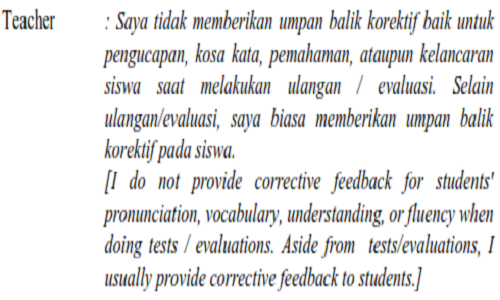
A Case Study of Teacher’s Practice and Students’ Preferences of Corrective Feedback in English Speaking Activities in The Classroom
Abstract
Keywords
Full Text:
PDFReferences
Afinda, B. N., Anwar, S., & Sumarna, O. (2023). Analysis of The Need for Applied Science Teaching Materials in Chemical Materials in Vocational School, Department of Culinary, Tangerang District. Journal of Education and Learning Research, 1(1), 30-36.
Agustia, Z., Yennita, Y., & Fakhruddin, F. (2024). Profile of Critical Thinking Ability of Class VIII State Middle School Students in Science Learning. Journal of Education and Learning Research, 2(1), 46-53.
Alsolami, R. (2019). Effect of Oral Corrective Feedback on Language Skills. Theory and Practice in Language Studies, 9(6), 672-677.
Agudo, M., & de Dios, J. (2013). An Investigation into how EFL Learners Emotionally Respond to Teachers' Oral Corrective Feedback. Colombian Applied Linguistics Journal, 15(2), 265-278.
Crysta, D. (2010). English as a Global Language, United Kingdom: Cambridge University Press.
Dilek, F. (2015). Learners Preferences of Oral Corrective Feedback: An Example of Turkish as a Foreign Language Learners. Educational Research and Reviews, 10(9), 1311-1317.
Gall, M. D., Gall, J. P., & Borg, W. R. (2007). Educational Research: An Introduction (8th ed.). Pearson.
Gamlo, N. H. (2019). EFL Learners‟ Preferences of Corrective Feedback in Speaking Activities. World, 9(2). doi:10.5430/wjel.v9n2p28
Gibbs, G., & Simpson, C. (2004). Does your Assessment Support Your Students’ Learning. Journal of Teaching and learning in Higher Education, 1(1), 1-30.
Gorji, F., Afraz, S., & Samimi, F. (2023). Assessing English Language Quality of EFL Students: Links to A Grounded Theory. Journal of Language, Culture, and Translation, 5(1), 133-149.
Khunaivi, H., & Hartono, R. (2015). Teacher’s and Student’s Perceptions Of Corrective Feedback In Teaching Speaking. English Education Journal, 5(2). Retrieved from https://journal.unnes.ac.id/sju/index.php/eej/article/view/9799
Li, S. (2018). Corrective Feedback in L2 Speech Production. The TESOL Encyclopedia of English Language Teaching, 1-9.
Lyster, R. and L. Ranta. (1997) ‘Corrective Feedback and Learner Uptake’. Studies in Second Language Acquisition 19/1: 37–66
Lyster, R. (1998). Negotiation of form, Recasts, and Explicit Correction in Relation to Error Types and Learner Repair in Immersion Classrooms. Language Learning, 48(2), 183-218.
Mulyani, S., Ningsih, N., & Setyaningrum, N. I. (2022). Students’preferencess Towards Oral Corrective Feedback In A Speaking Class. Eternal (English, Teaching, Learning, and Research Journal), 8(1), 174-183. doi: https://doi.org/10.24252/Eternal.V81.2022.A12
Muslem, A., & Abbas, M. (2017). The Effectiveness of Immersive Multimedia Learning with Peer Support on English Speaking and Reading Aloud. International Journal of Instruction, 10(1), 203-218.
Muslem, A., Zulfikar, T., Astilla, I., Heriansyah, H., & Marhaban, S. (2021). Students' Preferences toward Oral Corrective feedback in Speaking Classroom: A Case at English Education Department Students. International Journal of Language Education, 5(4), 244-259. doi: https://doi.org/10.26858/ijole.v5i4.19010
Olmezer-Ozturk, E. (2019). Beliefs and Practices of Turkish EFL Teachers Regarding Oral Corrective Feedback: a Small-Scale Classroom Research Study. The Language Learning Journal, 47(2), 219-228. https://doi.org/10.1080/09571736.2016.1263360
Sakiroglu, H. Ü. (2020). Oral Corrective Feedback Preferences of University Students in English Communication Classes. International Journal of Research in Education and Science, 6(1), 172-178.
Sepehrinia, S., & Mehdizadeh, M. (2016). Oral Corrective Feedback: Teachers’ Concerns and Researchers’ Orientation. The Language Learning Journal, 46(4), 483–500. doi:10.1080/09571736.2016.1172328
Syakira, S., & Sahril, S. (2022). Learners' Perceptions on the use of Oral Corrective Feedback in One-to-One EFL Classroom. Eralingua: Jurnal Pendidikan Bahasa Asing dan Sastra, 6(2).
Van Ha, X., Nguyen, L. T., & Hung, B. P. (2021). Oral Corrective Feedback in English as a Foreign Language Classrooms: A Teaching and Learning Perspective. Heliyon, 7(7), e07550.
Zhao, W. (2015). Learners’ Preferences for Oral Corrective Feedback and their Effects on Second Language Noticing and Learning Motivation. Mcgill University (canada).
Zhu, Y., & Wang, B. (2019). Investigating English Language Learners’ Beliefs About oral Corrective Feedback at Chinese Universities: A Large-Scale Survey. Language awareness, 28(2), 139-161. https://doi.org/10.1080/09658416.2019.1620755
DOI: http://dx.doi.org/10.31258/jes.8.3.p.336-348
Refbacks
- There are currently no refbacks.
Copyright (c) 2024 Sheila Oktavani

This work is licensed under a Creative Commons Attribution 4.0 International License.
Publisher: FKIP Universitas Riau












